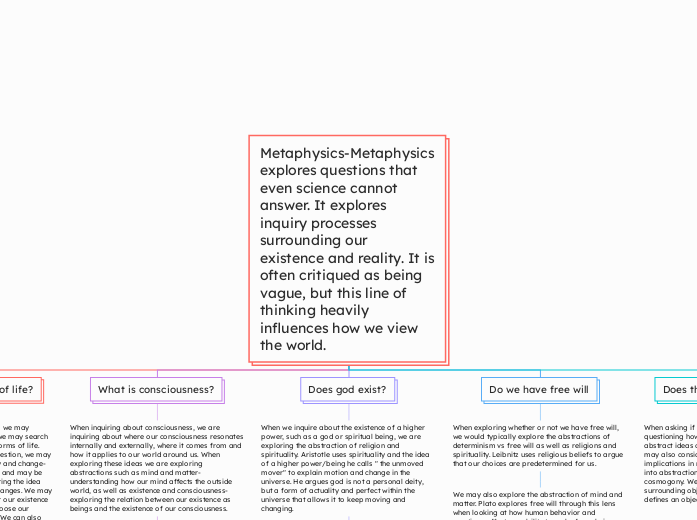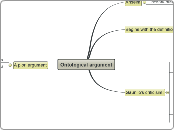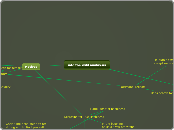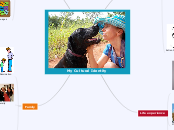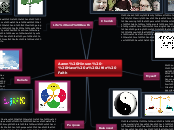Metaphysics-Metaphysics explores questions that even science cannot answer. It explores inquiry processes surrounding our existence and reality. It is often critiqued as being vague, but this line of thinking heavily influences how we view the world.
Does the world really exist?
When asking if the world really exists, we are questioning how we define existence thus exploring abstract ideas of consciousness and existence. We may also consider scientific and theological implications in relation to this question, delving into abstractions such as cosmology and cosmogony. We may also consider ideas surrounding objects and their properties- what defines an objects existence?
Philosopher Berkley defends his reasoning to this question through abstractions related to existence and consciousness, reasoning that the external world only exists as it is consciously perceived.
Descartes ultimately reasoned through abstract cosmogonical ideas by reasoning the world does exist as god is non-deceptive and wouldn't let him be deceived about the world.
When we consider how the world came to be, when debating evolution even, we are questioning the worlds existence.
Do we have free will
When exploring whether or not we have free will, we would typically explore the abstractions of determinism vs free will as well as religions and spirituality. Leibnitz uses religious beliefs to argue that our choices are predetermined for us.
We may also explore the abstraction of mind and matter. Plato explores free will through this lens when looking at how human behavior and emotions affect our ability to make free choices.
Today, young minds around me including me consistently question their free will as they are forced to go to school everyday and choose career paths. Many of my peers today feel lost or trapped by predetermined paths set by societal and parental expectations. Sure we have the choice to choose our futures, but are they our futures by choice, or are they our planned futures we choose under pressure?
Does god exist?
When we inquire about the existence of a higher power, such as a god or spiritual being, we are exploring the abstraction of religion and spirituality. Aristotle uses spirituality and the idea of a higher power/being he calls " the unmoved mover" to explain motion and change in the universe. He argues god is not a personal deity, but a form of actuality and perfect within the universe that allows it to keep moving and changing.
When faced with hard times, such as death or loss of a loved one, we may find ourselves questioning the existence of a higher power and using metaphysical reasoning when wondering where our loved ones are now.
What is consciousness?
When inquiring about consciousness, we are inquiring about where our consciousness resonates internally and externally, where it comes from and how it applies to our world around us. When exploring these ideas we are exploring abstractions such as mind and matter-understanding how our mind affects the outside world, as well as existence and consciousness- exploring the relation between our existence as beings and the existence of our consciousness.
Philosopher Descartes explores the abstraction of existence and consciousness stating " I think, therefore I am" essentially stating that his existences is undeniable because he is conscious of his existence and without his existence he cannot be conscious. He also explores ideas surrounding mind and matter as he considered the mind to be distinct from the body, a non material substance, thus adding to the debate on the mind and the body, reasoning that our mind is not controlled by our body, our mind is our thoughts that affects our body.
When we work to understand our patterns of thoughts and behavior, where they come from and how they are affecting our choices, actions and even physical health, we are exploring our consciousness and it's relation to our existence and our mind-body connection.
what is the meaning of life?
when exploring the meaning of life, we may search for a personal meaning, or we may search for a meaning we can apply to all forms of life. When exploring this complicated question, we may look at abstractions such as identity and change- exploring how our identity forms us and may be tied to meaning and perhaps exploring the idea that meaning changes as identity changes. We may also consider existence and whether our existence holds any purpose, or if we must choose our purposes throughout our existence. We can also use determinism and free will to argue that our meaning is either predetermined for us or we must use our free will to make purpose and meaning in an otherwise meaningless world.
Socrates reasons through abstraction of identity and free will, stating that we must find our meaning through taking initiative to self-examine and reflect throughout life. He claims " the unexamined life is not worth living"
Aristotle reasons the ultimate meaning of life through the abstraction of free will, arguing one will live a fulfilled life if they choose to exercise our capacities in virtuous ways.
As we age through life and learn new things about how our past, present and future endeavors, choices, relationships etc. affect us, we continue to search and learn more about our personal meaning of life.
